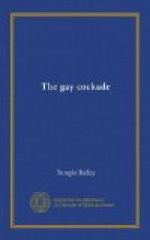So Mary ran along, and her heart sang. And when she got home she unwrapped the fat doll and kissed every curl of her, and she set her under the lovely lamp; and then she got a long box and put something in it and wrapped it and addressed it to Kingdon Knox.
And after that she went to the window and stood there, watching until she saw Tommy coming.
And the next morning when Kingdon Knox found the long box on his desk, addressed in Mary’s handwriting, he thought it was a Christmas present, and he opened it, smiling.
But his smile died as he read the note which lay on top of a string of jade beads:
“I am sending them back, Mr. Knox, with my resignation. I should never have taken them. But somehow you made me feel that I was a sort of fairy princess, and that jade beads belonged to me, and everything beautiful, and that some day life would bring them. But life isn’t that, and you knew it and I didn’t. Life is just warm human happiness, and a home, and work for those we love. And so, after all, I am going to marry Tommy. And Nannie is going to marry Dick. In a way it is a happy ending, and in a way it isn’t, because I’ve grown away from the kind of life I must live with Tommy, and I am afraid that in some ways I am not fitted for it. But Tommy says that I am silly to be afraid. And in the future I am going to trust Tommy.”
And so Mary went out of Kingdon Knox’s life. And on Christmas Day at the head of a great table, with servants to the right of him and servants to the left, he carved a mammoth turkey; and there was silver shining, and glass sparkling and lovely women smiling, all in honor of the merry season.
But Kingdon Knox was not merry as he thought of the jade beads and of Mary’s empty desk.
BEGGARS ON HORSEBACK
I
With the Merryman girls economy was a fine art. Money was spent by them to preserve the family traditions. Nothing else counted. Everything was sacrificed to the gods of yesterday.
Little Anne Merryman had shivered all her short life in the bleakness of this domestic ideal.
“Why can’t I have butter on my bread?” she had demanded in her long-legged schoolgirl days, when she had worn her fair hair in a fat braid down her back.
The answers had never been satisfying. Well-bred people might, Amy indicated, go without butter. Their income was not elastic, and there were things more important.
“What things? Amy, I’m so hungry I could eat a house.”
It was these expressions of Anne’s about food which shocked Amy and Ethel.
“I’d sell my soul for a slice of roast beef.”
“Anne!”
“Well, I would!”
“I—I don’t see how you can be so ordinary, Anne.”




